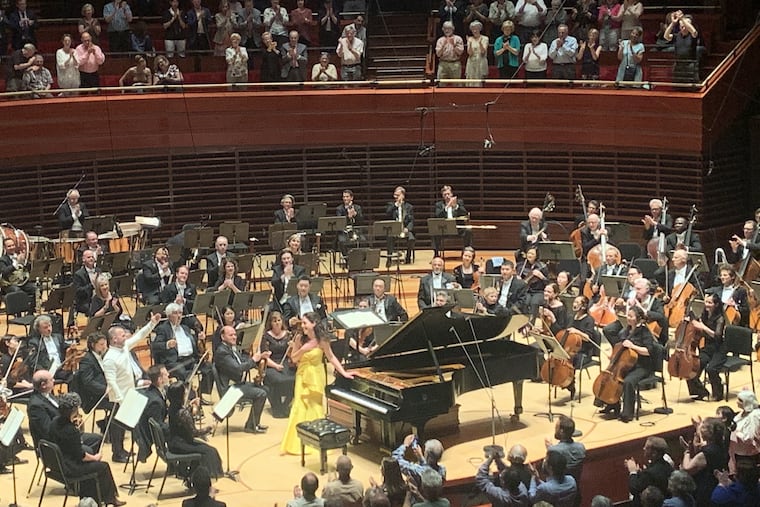Philadelphia Orchestra’s latest performance shows why this ensemble, in this moment, is worth the $55 million
Yannick Nézet-Séguin found a new clarity in Stravinsky's "Funeral Song." Soloist Beatrice Rana thrilled in her Philadelphia premiere.

When a donation envelope fell out of my Philadelphia Orchestra program on Thursday night, I couldn’t help thinking, in light of the $55 million gift that had been announced that day, that the orchestra won’t be needing these for a while.
Not true, of course, since $50 million of that is for the long-term endowment, not operating costs. But the “Russian Masters” program — also featuring the much-anticipated Philadelphia debut of pianist Beatrice Rana — helped you grasp what qualities warranted that massive gift.
The orchestra has played with great distinction at most points in its history. But the opening selection — Stravinsky’s Funeral Song, Op. 5, written on the death of Rimsky-Korsakov — showed how the Philadelphia sound has come to stand for something more than just beauty. Was it an inner drive or cognitive understanding of the music that allowed the ensemble to elevate the music’s artistic stature?
Like many early works (it dates from 1909), this one has trouble saying what it means. You could listen to the music knowing that Stravinsky intended individual instruments to say farewell to Rimsky-Korsakov. But I never really felt it until this performance, thanks to the clarity of intent from music director Yannick Nézet-Séguin and the aura of importance that came with it.
Discovered only in recent years, the piece came off like a manifesto of sorts. The opening clearly foreshadows The Firebird. Explicit references to Wagner point to the ways Stravinsky would similarly employ music of Pergolesi and Tchaikovsky in later works such as Pulcinella and The Fairy’s Kiss. The visual imagery points to the balletic sensibility that would be evident even in his concertos and symphonies.
Meanwhile, Rachmaninoff’s Symphony No. 1, also an early work that was lost for decades, can be an unconvincing wedding of bombast and well-learned compositional devices. If memory serves, Nézet-Séguin’s 2014 outing with the symphony was glittering but episodic.
This time, a more credible symphonic floor plan was apparent: All four movements were variations on the same themes, emerging like fraternal quadruplets, all with a strong family resemblance but with fully independent personalities and perhaps even nationalities.
The second movement seems cut from similar cloth as Mendelssohn’s A Midsummer Night’s Dream music. The symphony’s digressions remain unavoidable, and Nézet-Séguin embraced moments when the music took a vacation from its own momentum and decided to make chamber music.
Prokofiev’s Piano Concerto No. 3, a high-velocity crowd pleaser written when the composer was only 30, also had a change of attitude. In a recent webcast from Detroit, pianist Rana was heard harnessing the music’s power through an accumulation of details with conductor Leonard Slatkin.
With Nézet-Séguin, the first and third movements felt like a series of tidal waves that were thrilling in the extreme. In contrast, the slow second movement showed the kind of Mozartean detail that Rana can bring to Prokofiev’s angularity.
For the most part, this performance was out to beat the likes of Martha Argerich at her own game. Only a handful of pianists can aspire to that.
And Rana’s encore, Chopin’s Etude, Op. 25 No. 1, was something only she can do. Out of an inviting blanket of pianistic sound came a beautifully contoured melody that spoke almost conversationally, constantly evolving into new emotional vistas that gave the piece’s two-minute duration something close to an epic quality.
The etude didn’t just sing. It spoke.
The Philadelphia Orchestra’s program is repeated 8 p.m. Friday at Carnegie Hall (details at 212-247-7800 or carnegiehall.org), and 8 p.m. Saturday at the Kimmel Center. Tickets for Kimmel performance $56-$158. Information: 215-893-1999 or philorch.org.